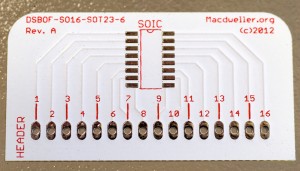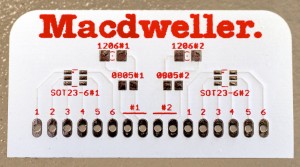The Examination
 First, I have to say, the red-on-white look is sweet, and I may well use it for future boards. White-on-green is so overdone! Although they do also offer custom colors I think, so that’s a thought as well…
First, I have to say, the red-on-white look is sweet, and I may well use it for future boards. White-on-green is so overdone! Although they do also offer custom colors I think, so that’s a thought as well…
But I digress.
There really isn’t much to these boards, as I’ve said. A visual inspection shows properly-aligned drill hits; traces and masking appear to be nice and clean. Gold Phoenix claims a 15% failure rate on untested boards (2% with E-testing, at least on 4-layer), but for the price, I’m not complaining. I’m also not going to bother to test all hundred of them.
I would guess that paying for E-Test on the 2-layer boards would drop it to the 2% failure rate, but you’ll need to email them and ask if this is a concern for you. A big part of me wonders if the disclaimer is just CYA on their part, but there’s no real way to tell without ordering (and testing) some decently complex boards.
Mechanically, the only thing I noticed is that the HASL finishing wasn’t quite as even as it was with the TuneConsole boards from Advanced Circuits. It’s not bad enough to be a problem most likely, so I’m not worried about it.
Cosmetically, however, the silk-screen was questionable on some of the boards.
 I only pulled ten of ’em out, and on some of them, the silkscreen appears smudged. It’s still perfectly readable, but not sharp like it is on the front side (you can see this in the image at right). Bit of a bummer, really.
I only pulled ten of ’em out, and on some of them, the silkscreen appears smudged. It’s still perfectly readable, but not sharp like it is on the front side (you can see this in the image at right). Bit of a bummer, really.
The difference is only really noticeable on three out of ten; four if you count one that you’d probably only notice next to a perfect board. Again, all of them are readable; some of them just don’t have that super-high-quality look. All in all, it’s not bad enough to be a real problem.
Beyond that, I have no complaints, but the proof will be in the pudding. I don’t have any 16-pin right-angle headers in the parts bin, and they won’t arrive for a few days yet, so I can’t really tinker much. I unfortunately forgot to get them ordered earlier in the week.
The Verdict
I find the design of most web presences in this industry to be appalling. Even 4pcb.com needs work; it may be functional, but it’s still ugly and unfriendly to the newcomer. I expected more of the same with Gold Phoenix – but was pleasantly surprised. Their site is laid out reasonably well, and apart from a few spelling errors, it really does look and act like a professional, modern system.
The quote process, while not instant, is easy enough to work with, and their prices are very, very good. I suspect it would’ve cost me around $140 for 8 of the larger TuneConsole boards (shipped), which is a fair bit cheaper than I paid through Advanced Circuits for the same spec when you account for the additional 3 boards. Also, the per-board price drops like a rock with increased quantity.
The boards themselves are more than acceptable. The silkscreen issue is, as noted, a bit of a bummer, but it’s the only real complaint I have. Granted, these weren’t complex boards – but given the number of people who use Gold Phoenix, I wouldn’t expect many problems. Pay for the E-Test on 2-layer boards, and you’ll have even fewer.
They also beat Advanced Circuits in turnaround and shipping time, which was a bit shocking.
All in all, I’m extremely happy with the service I received. Though I did end up with more boards than I can realistically use (seriously, what am I going to do with these?! I’ll use maybe ten or twenty over the next year!), the only reason I paid more than I would’ve through 4pcb is because I wanted custom silk/mask options and some nice routing. Can’t really complain about that.
If you settle for the default options, you can have your prototype order for $100; quantity depends on the size of your board. Not too shabby, and something to consider for the future. They also offer solder stencils and assembly services, which is good to know for the future.
Given the price difference, this is now my favorite board house. I’ll likely review others simply because I can, but I’d be quite happy to give them my business in the future.
S.

Gold Phoenix’s address in Oakville, Ontario is right around the corner from my office. It’s a residential street in a fairly well-off neighbourhood, so I think it’s safe to assume there’s no manufacturing going on there.
I’ve used them in the past – mostly the 155 square inch special. As a multi-project panel it came out to something like $140 for a few each of up to 5 different projects – not bad.
These days, though, I’m using Seeedstudio’s Fusion service. Great quality boards, and a 10 cm by 10 cm board runs about $25 for 10 pieces, though only 5 are tested. If you can keep it small, 5 cm by 5 cm is $10 for 10, 5 tested. Worth a look.
I’m somehow not surprised that it’s someone’s house. If I had to guess, I’d say it’s probably not unlike all those companies that incorporate in Delware. Not sure what the business advantage would be for them in having a Canadian address, but I’m sure there is one.
Not sure what the business advantage would be for them in having a Canadian address, but I’m sure there is one.
As for Seeed, they’re definitely on my list to try, especially at those prices; now I just need another excuse. I do have a few ideas in the hopper…
white solder mask is standard color, should’ be add extra fee.also the board outline isn’t complex shape. I think the charge of Gold Phoenix is little much more. There are many PCB manufacturers in China specilize in prototype and small quantity PCB fabricate.like King Sun PCB (www.kingsunpcb.com), good quality and resonable. maybe you can try.